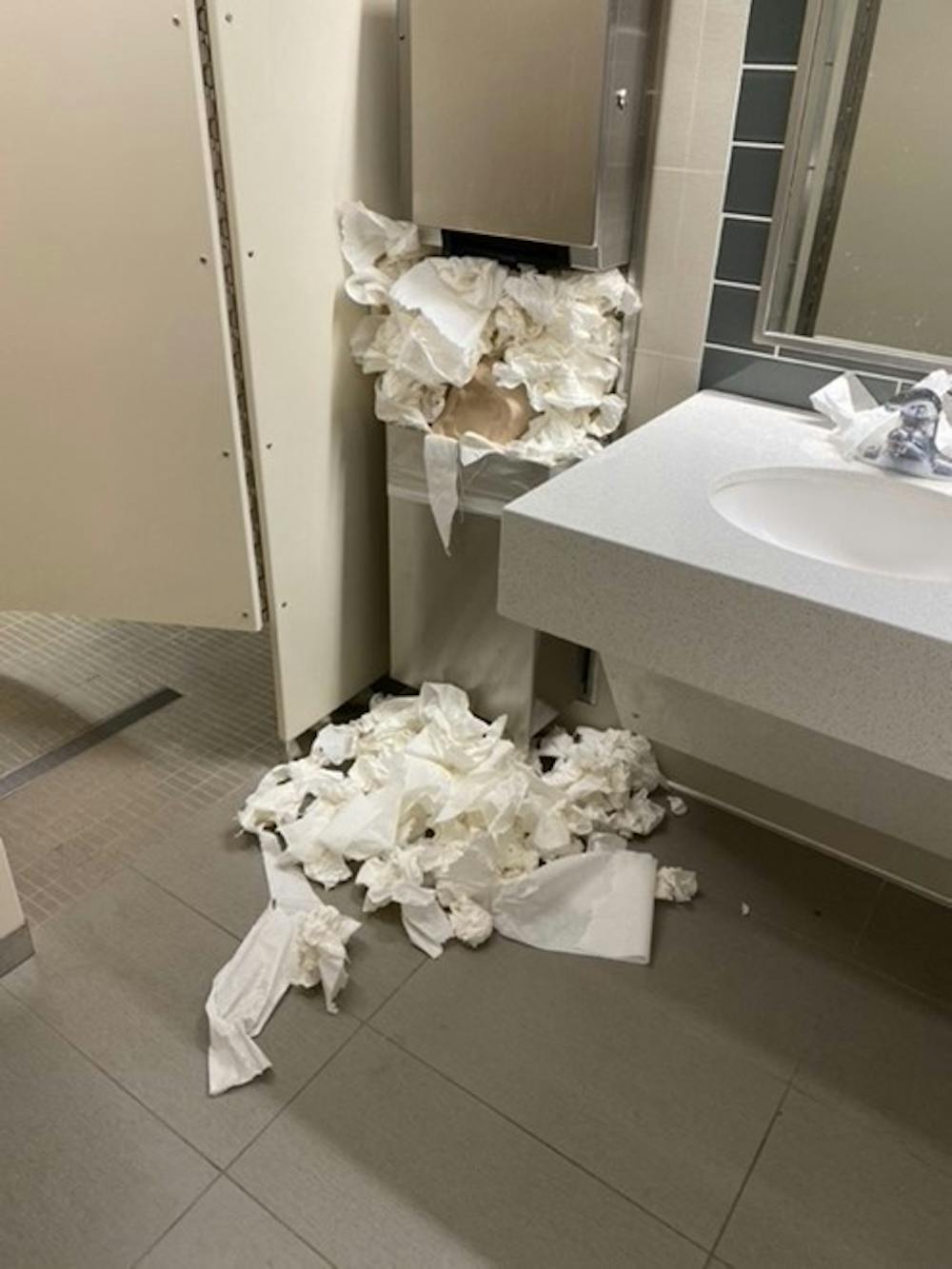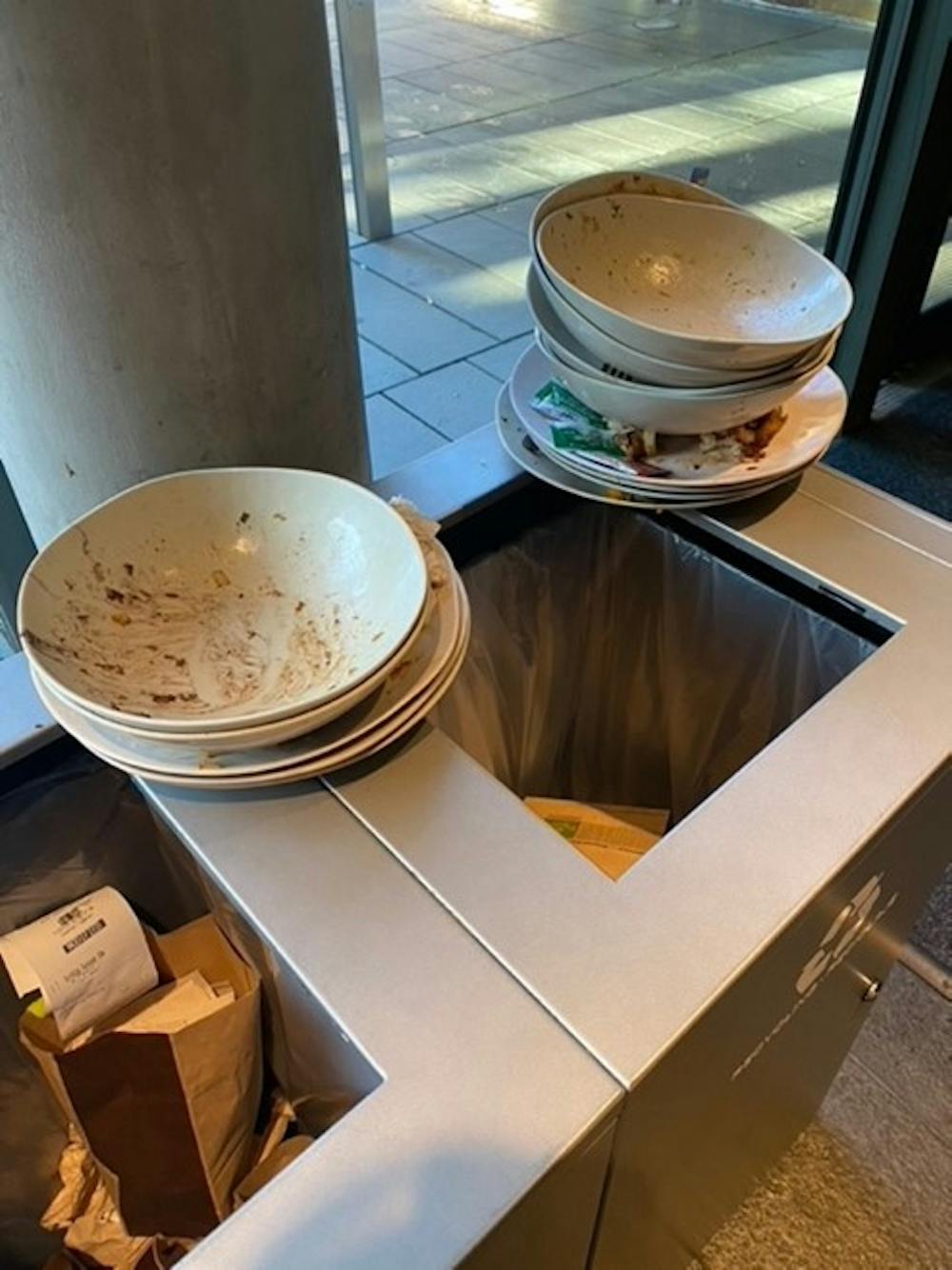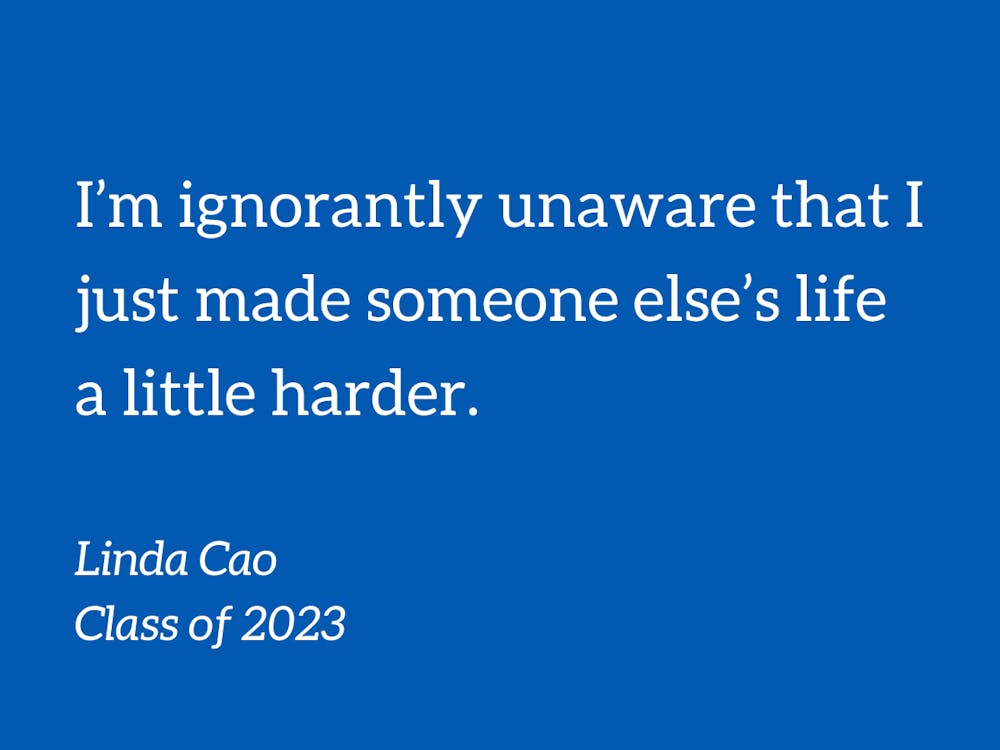I love bagels, especially the toasted Everything Bagel with cream cheese from Panera. I always joke that they’re called Everything Bagels not because of the various “everything” toppings but that they leave a mess everywhere. The poppy seeds and onion toppings always scatter onto my lap, and I, preoccupied with scrolling through Twitter, mindlessly brush the mess onto the floor. Hurried to attend class, I quickly chow down the rest of my bagel, dust the remaining seasoning off my hands, and leave.
I know that the commute from WU to Physics is almost seven minutes. I know that if I mobile order my coffee from Beyu as I wait in line at Panera, I can pick up my second coffee of the day along the way to Physics. In the worst case scenario, I know I could just buy a Red Bull from the Duke store and still arrive to class in time sufficiently caffeinated. See, like most Duke students, I’m aware of all the little tricks to make my life a little easier.
Yet, I’m ignorantly unaware that I just made someone else’s life a little harder.
I don’t know about the confetti mess from my bagel, leaving behind a fiesta of sesame seeds, garlic dustings, and crisp crumbs. I don’t know about the heavy sigh from the cleaning lady, whose name I incredulously never considered asking, when she sees the aftermath of my breakfast stunt. I was so distracted with my personal business, arranging my tight-knit schedule for the day, that I neglected to care and respect my surroundings, leaving our staff to clean up my sorry-I-really-have-to-go-but-I-somehow-still-have-time-for-coffee mess.
Recently, I have noticed that we struggle with respecting our surroundings. Dirty dishes are piled (but perfectly balanced) around the trash cans in Panera, as if someone intended to start a game of giant Jenga. Craven bathroom trashcans are overwhelmed with damp paper towels; are we trying to start Mount Everest 2.0? Nearly-empty drinks are abandoned on tables in Café as if a zombie apocalypse initiated immediate evacuation.


A little dramatic, but point aside, Houston, we have a problem.
Not only is our behavior problematic, but the language we use as well. If you refer to the first paragraph of this article, you’ll notice that I phrased the sentence so that the bagel seasoning was the subject. “The poppy seeds and onion toppings always scatter in my lap,” as if the seasoning is at fault for making the mess. Thus, shifting the responsibility of the mess away from me, the actual reason for the mess, to inanimate objects.
“Oops, the salad fell right off my fork.” “Damn, the paper tower missed the trash.” “No! My drink spilled!” Even from the language we use regarding messes and clean-up, let alone our behavior, we unconsciously shift the blame away from ourselves. Thus, we don’t feel responsible for the mess, transferring the expectation of clean-up to our staff.
My intention is not to point fingers. I confess that I can also be neglectful of my surroundings, ignorant to the extra work that I cause our hardworking staff. However, if your immediate reaction to this issue is that cleaning is the staff’s job and they are bound by a contract to manage the state of our surroundings, then I must alert you that your behavior mimics the same professors you probably dislike.
We’ve all had weeks where we’ve bit off more than we can chew. It’s 2 AM, and you’re contemplating if two Red Bulls and a Starbucks Triple Shot Espresso Energy Drink could potentially cause a stroke. You have a STA199 problem set to start, tedious reading for a pre-lecture quiz in Ethics to complete, and an essay due at noon for a film analysis class that was false advertised as easy. You’re tired, burnt out.
Evidently, there’s a lot on your plate (no pun intended). Just when you’re on the edge of a mental breakdown, you receive a reply from your film analysis professor, responding to your last-ditch effort email, begging for an extension. Miraculously, your wish was granted.
You, as a Duke student, are bound by a contractual agreement to fulfill all course expectations set by your professors the second you clicked “Register” on Duke. Even if managing the courses can be difficult and overwhelming, you are obligated to complete the assignments and tasks assigned by your professors. That is your job.
Professors are not obligated to grant extensions nor perform any act of compassion; they are here to transfer their knowledge. Sure, we are (technically) not obligated to clean up after ourselves; we are here to learn. However, don’t you feel so much better when professors are considerate of your demanding academic life, understanding that an extension might ease off some of the pressure? Other professors may not bestow the same compassion, and they have a right to enforce their deadlines. As students, we don’t necessarily hate these professors, but we also don’t like them very much.
I don’t want this article to be brushed off as a nagging PSA, scolding my classmates and peer as I sit on a nonexistent high-horse. I simply want us to be more conscious of our behavior and the potential consequences, although small, of our actions. Consider my breakfast routine. I, one student, leaves a mess of a bagel. Now, if I was the only student at Duke who loved Everything Bagels, then the piñata scatterings from my breakfast might be irrelevant. However, there are over 15,000 Duke students. Although not all 15,000 students might eat Everything Bagels (or else there’d be none left for me), I know that our 15,000 students will engage with our university’s common spaces. WU, Bryan Center, The Link, and more are all common areas where we collaborate, recharge, and thrive. One person’s mess might not be an issue, but 15,000 messes can be a daunting problem for our staff.
I don’t believe that Duke students’ have the intent to actively complicate our staff’s working environment and responsibilities. I know that we’re juggling a dozen different itineraries, and we have people to meet, places to be. Yet, when we’re so focused on ourselves, we forget that we live in a community, where our decisions can influence others. As prospective leaders and innovators of the future decades, we should be mindful of our actions and practice consideration in our current little pseudo-reality. We may not be mindful all the time, but we can certainly be more mindful. We could discard paper towels in our dorm trashcans. We could leave our dishes in the dish return. Perhaps, even during our busiest moments, we can be a little more careful when we eat Everything Bagels.
Linda Cao is a Trinity junior. Her column runs on alternate Wednesdays.
Get The Chronicle straight to your inbox
Signup for our weekly newsletter. Cancel at any time.
Linda Cao is a Trinity senior and an opinion managing editor of The Chronicle's 119th volume.

